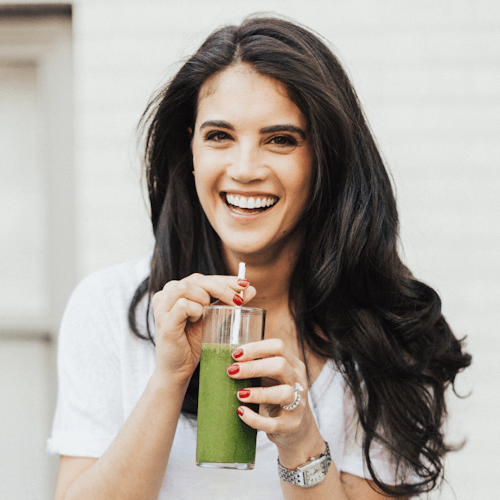You ate dinner, put the kids to bed and find yourself standing in front of the open fridge searching for something sweet. You spot the leftover cupcakes from your child's birthday party, tempted to indulge in that immediate sugar rush you get from sweets, but tell yourself "No, eating a sugary, fattening cupcake is bad." You unhappily skip the cupcake and choose a "good" sliced apple with peanut butter to "satisfy" your sweet tooth.
Thirty minutes later you're back in the kitchen grabbing a couple of squares of dark chocolate, internally justifying it to yourself because dark chocolate has antioxidants, so it's "good."
Ten minutes after that, you give in and eat the cupcake, scarfing it down without savoring any of sugary sweetness you were looking for in the first place. You immediately feel guilty, shameful and disgusted with yourself, vowing to "eat clean" tomorrow.
Does this sound familiar?
What if you were told that you could wake up and eat what you wanted, when you wanted, feel energized, nourished, happy and healthy?
It's called "intuitive eating," and it's the antithesis to the multibillion-dollar dieting industry.
Evelyn Tribole, M.S., R.D.N. and Elyse Resch, M.S., R.D.N., F.A.D.A., first coined the term when they published "Intuitive Eating" in 1995, but the principles of intuitive eating have been discussed since the time of Aristotle. Thousands of individuals use the principles of intuitive eating to foster and maintain a healthy relationship with food, but in the last several years, the movement has gained significant momentum.
Intuitive eating is exactly what it sounds like: eating by listening to your body, following your innate hunger and satiety cues, and indulging in what your body craves. Intuitive eating helps you restore the wisdom with which you were born when it comes to food.
Compared to traditional dieting, intuitive eating focuses on nourishing your body intuitively. All dieting rules are eliminated. Instead of counting calories, grams of carbohydrates or fat, you honor your hunger. Instead of eliminating or restricting food groups because it's the latest dieting trend, all foods fit. Instead of viewing foods as "good" or "bad," you recognize that food is inherently neutral.
Dietitians and nutrition professionals around the world are adopting a non-diet approach to eating, teaching their clients to eat with intuition, or what is sometimes referred to as mindful eating.
Studies suggest that intuitive eating can help individuals maintain a healthy weight, improve cholesterol levels, reduce psychological distress, boost self-esteem, regulate metabolism and improve fitness levels. So why aren't more individuals eating with intuition?
Societal messages insinuate that thinness is equated with optimal health and success, which is exemplified by escalating rates of disordered eating, the multibillion-dollar dieting industry, and climbing rates of obesity worldwide. If dieting worked, individuals wouldn't be suffering from obesity and the myriad of chronic diseases associated with it.
But will intuitive eating work for you? The answer is a resounding yes. By shifting your mindset, you can be free from dieting forever. Why? The answer is simple.
1. Intuitive eaters honor their hunger.
Hunger is a biological mechanism designed to keep us alive. Infants are born with strong, innate hunger and satiety cues, which translates to eating when they are hungry and stopping when they are full. New parents quickly learn their child's hunger signals and feed them accordingly.<pagebreak>
Researchers suggest that children's feeding cues, or self-regulation, can be disrupted as early as preschool. Ellyn Satter, M.S., R.D.N., M.S.S.W., an eating competence expert and founder of the well-accepted Satter Eating Competence Model, suggests that children are born as competent eaters, but that as individuals age, external influences—including those from peers, family and the media—challenge these innate beliefs, which may lead to picky eating and abandonment of self-regulation. Strict parental controls can also disrupt a child's responsiveness to inborn hunger cues, which can carry over into adolescence and adulthood.
To become an intuitive eater, you must eat as you did as an infant, in accordance to your hunger. Many individuals ignore their hunger if a scheduled meal is soon, for example. It is essential to honor your hunger to truly eat with intuition, even if it is an hour before dinner. Eating when you feel hungry helps maintain adequate blood sugar levels and reduces overeating at meal times.
Emily Kyle, M.S., R.D.N., founder of The School of Health & Happiness recognized the power of trusting oneself first-hand. "Once I started to incorporate the principles of intuitive eating into my own practice, I realized that many of my clients are finally learning that they can trust their bodies and the inner wisdom they were naturally born with, after years of doubt and self-questioning," she says.
Mastering the simple act of eating when you are hungry, instead of waiting, can dramatically improve cravings and future binging, which ultimately helps with effortless weight maintenance.
2. Intuitive eaters reject the diet mentality.
There is a reason the dieting industry is a multibillion-dollar industry: It does not work. Studies consistently show that one-third to two-thirds of dieters regain weight that was lost, and often more than with which they started. To become an intuitive eater, it is essential that you quiet the dieting voice within. Intuitive eating is not a diet that you are on, but rather a lifelong journey to reclaim a healthy and happy relationship with food. Whether you have struggled with obesity, disordered eating or a diagnosed eating disorder, intuitive eating has a place in your journey to help you make peace with food.
Intuitive eating is not a weight-loss plan. Instead, intuitive eating will help you find your natural, set-point weight and let you eat with confidence. It is important to note, however, that after years of dieting and restriction, your body may take time to adjust to its set point, since chronic dieting can confuse your metabolism. Diet cycling, commonly referred to as "yo-yo dieting," physiologically causes your body to hold on to excess fat because it is worried that you may experience another period of famine or modern-day undereating.
For many chronic dieters, rejecting the diet mentality can be one of the most difficult aspects of learning to eat with intuition. Society encourages men and women to strive to be as thin as possible by inducing fear of certain foods, perpetuating that a low-carb diet, for example, is best. Overcoming societal messages by focusing on what makes you feel your best, in accordance with innate hunger and satiety signals, will help you eat intuitively with confidence.
3. Intuitive eaters challenge the food police.
If you've ever felt shame or guilt for eating certain foods, you may be listening to the food police, instead of your own intuition. Due to the constant barrage of dieting messages you're inundated with daily, it is easy to feel like you "should" be eating a certain way at designated times, or that particular foods are "good" or "bad." But food cannot be morally good nor bad. It's just food and is neutral.
One of the first steps to becoming an intuitive eater is to eat according to your body's cravings, while acutely tuning in to your hunger, regardless of what society deems as acceptable. Give yourself permission to eat what your body desires, with neither shame nor guilt, to challenge the food police. Over time, you will be able to eliminate stigmatizing food labels, so foods that were once off limits—like that aforementioned cupcake—may not even appeal to you anymore.
You may wonder how a dietitian can encourage you to eat pastries for breakfast, but the crux of the intuitive eating movement is to learn to focus on and trust your body to crave the foods it wants and needs, including vegetables and fruit.
"When I meet a client for the first time and tell them that I am not going to put them on a diet, that they can literally eat anything they want, they immediately relax," intuitive eating dietitian Kaleigh McMordie, M.C.N., R.D.N., L.D. describes. "When you stop worrying about food 90 percent of the day, you open up to so much more! It's amazing how your relationships and your day-to-day living change for the better."
Stressing over what you eat doesn't promote vitality and health. As Satter says, "When the joy goes out of eating, nutrition suffers." In the end, giving yourself permission to feel completely satisfied from the foods that you're eating may lead you to crave more nourishing foods that are best for your body and what's better than that?
Get in Touch With Your Hunger
Intuitive eating is a very individualized process, so it's a good idea to seek out a registered dietitian specializing in intuitive eating before you get started.
If you can't wait to get going, start your venture into intuitive eating with this simple exercise to bring attention to your hunger and fullness. Think of your hunger and fullness on a scale of one to 10, where one is absolutely famished and 10 is post-Thanksgiving feast. Before you sit down for your next meal, note where your hunger falls on the scale. Considering eating your arm? That may be a level two. If you are hungry and feel ready to eat, but you're not overly hungry, this is probably a three or four.
Once you decide to eat, check in with yourself mid-meal. How full are you now? Is your edgy hunger satisfied but you're not yet full? When you feel full and content, but not overly full, put down your fork to truly notice this feeling. The more you practice getting in touch with your hunger and fullness levels, the more of an intuitive eater you can become.
|








